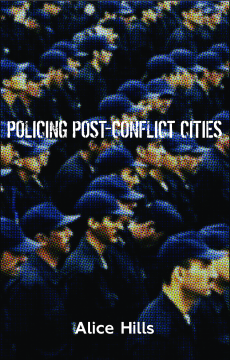
Additional Information
Book Details
Abstract
How and why does order emerge after conflict? What does it mean in the context of the twenty-first century post-colonial city? From Kabul, Kigali and Kinshasa to Baghdad and Basra, people, abandoned by the state, make their own rules.With security increasingly ghettoised, survival becomes a matter of manipulation and hustling.
In this book, Alice Hills discusses the interface between order and security. While analysts and donors emphasise security, Hills argues that order is much more meaningful for people’s lives. Focusing on the police as both providers of order and a measure of its success, the book shows that order depends more on what has gone before than on reconstruction efforts and that tension is inevitable as donors attempt to reform brutal local policing.
Policing Post-Conflict Cities provides a powerful critique of the failure of liberal orthodoxy to understand the meaning of order.
Alice Hills is professor of conflict and security at the University of Leeds, where her specialist area is security governance in fragile states. Her research focuses on why police evolve as they do, and what explains the interactions between public police, governments, and militaries in sub-Saharan Africa.
'Through this magisterial analysis of policing in post-conflict cities, Alice Hills challenges the "cargo cult" status of police reform and the uncritical assumptions about democratic policing that are embedded in the liberal peace.'
Michael Pugh, University of Bradford
'Policing Post Conflict Cities is an engaging and provocative enquiry into the most basic of political challenges - the recontruction of "order" and the provision of "security" in post conflict urban locales. Here Alice Hills invites us to think way beyond current orthodoxies and to base our theories instead on the fluid and ambigious practices emerging from Bagdad, Basra, Kinshasa, Kigali and others. Policing Post-Conflict Cities will appeal to an audience who values critical scholarship.'
Elrena Van Der Spuy, University of Cape Town
Table of Contents
| Section Title | Page | Action | Price |
|---|---|---|---|
| Acknowledgements | vi | ||
| Acronyms and Abbreviations | vii | ||
| 1 Order in an Urban Century | 1 | ||
| Cities | 2 | ||
| Order | 11 | ||
| Power | 15 | ||
| Stability | 17 | ||
| Security and Order | 18 | ||
| Relevant Literature and Programmes | 19 | ||
| Methodology | 22 | ||
| Case Studies and Research Questions | 23 | ||
| Overview | 25 | ||
| 2 Controlling Cities | 28 | ||
| Post-conflict Cities | 28 | ||
| Influential Features | 30 | ||
| Policing the Aftermath | 37 | ||
| Damage Limitation | 39 | ||
| Police and Policing | 47 | ||
| Police and Order | 52 | ||
| Policing Field | 54 | ||
| Conclusion | 58 | ||
| 3 International Policing | 60 | ||
| Approaches to Policing | 62 | ||
| Democratic Policing | 65 | ||
| Table 3.1 Police support in emerging nations: generic model of typical problems and international police responses | 68 | ||
| Police Reform | 70 | ||
| UN Policing | 78 | ||
| Conclusion | 84 | ||
| 4 Ghetto Security | 88 | ||
| Iraq's Significance | 90 | ||
| Iraq's Re-emergent Order | 91 | ||
| Overview of Order and Insecurity in Iraq | 99 | ||
| Baghdad | 104 | ||
| Basra | 108 | ||
| Comparative Pictures | 115 | ||
| Conclusion | 118 | ||
| 5 Social Continuities and the Production of Order | 120 | ||
| Bosnia | 121 | ||
| Kabul | 133 | ||
| Kigali | 140 | ||
| Conclusion | 148 | ||
| 6 Making Their Own Rules | 150 | ||
| Mogadishu | 152 | ||
| Monrovia | 163 | ||
| Kinshasa | 171 | ||
| Conclusion | 177 | ||
| 7 Re-emergent Order | 179 | ||
| Nigeria | 180 | ||
| Southern Sudan | 186 | ||
| Grozny | 194 | ||
| Conclusion | 200 | ||
| 8 Challenging Orthodoxy | 201 | ||
| Summary of Findings | 203 | ||
| Key Factors and Indicators of Order | 203 | ||
| Table 8.1 Adaptive role of the police | 206 | ||
| Policing Change | 208 | ||
| Assessment | 211 | ||
| Research Agenda | 212 | ||
| Conclusion | 222 | ||
| Notes | 224 | ||
| Chapter 1 | 224 | ||
| Chapter 2 | 225 | ||
| Chapter 3 | 226 | ||
| Chapter 4 | 228 | ||
| Chapter 5 | 228 | ||
| Chapter 6 | 229 | ||
| Chapter 7 | 230 | ||
| Chapter 8 | 230 | ||
| References | 231 | ||
| Index | 253 |
